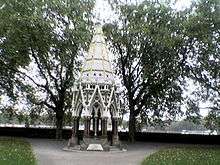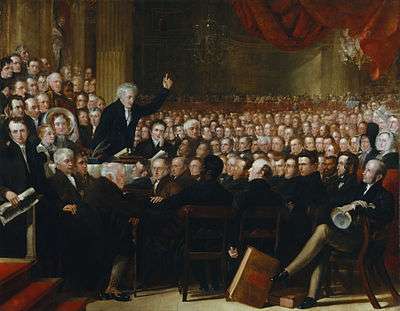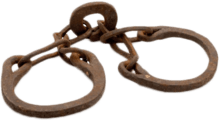Anti-Slavery International
| Abbreviation | Anti-Slavery |
|---|---|
| Motto | Today's fight for tomorrow's freedom |
| Purpose | Anti-slavery |
| Headquarters |
London, SW9 United Kingdom |
Region served | International |
Director | Jasmine O'Connor |
| Website |
www |
Anti-Slavery International is an international non-governmental organization, registered charity[1] and a lobby group, based in the United Kingdom. Founded in 1839, it is the world's oldest international human rights organization. It works exclusively against slavery and related abuses.[2]
It owes its origins to the radical element of an older Anti-Slavery Society, known as the "Agency Committee of the Society for the Mitigation and Gradual Abolition of Slavery Throughout the British Dominions", which had substantially achieved abolition of slavery in the British Empire. A successor organisation, the British and Foreign Anti-Slavery Society[3] was then created to campaign against the practice of slavery in other countries. In 1990 it was relaunched as "Anti-Slavery International", which works to combat slavery and related abuse.
Overview

Founded in 1839, it is the world’s oldest international human rights organisation and bases its work on the United Nations treaties against slavery.
It has consultative status with the United Nations Economic and Social Council and observer status at the International Labour Organization. It is a non-religious, non-political independent organisation.
Anti-Slavery International works closely with partner organisations from around the world to tackle all forms of slavery.
Modern-day slavery
Human trafficking is the illegal transportation of kidnapped women, children, and men across international borders in order to put them into slavery at the destination. This form of modern slavery is one of the most common and may affect the most people: it is estimated that between 500,000 and 800,000 victims enter the trade each year.
History

- ^ Anti-Slavery Society Convention, 1840, National Portrait Gallery, London
The first Anti-Slavery Society was founded in 1823 and was committed to the abolition of slavery in the British Empire, which was substantially achieved in 1838 under the terms of the Slavery Abolition Act 1833. In 1839, English activist Joseph Sturge formed a successor organisation, British and Foreign Anti-Slavery Society (today known as Anti-Slavery International), which worked to outlaw slavery in other countries.
In 1840, the World Anti-Slavery Convention was organised in London that attracted delegates from around the world (including from the United States of America, in the South of which slavery was at times referred to as "our peculiar institution") to the Freemasons' Hall, London on 12 June 1840. Many delegates were notable abolitionists, with Thomas Clarkson the key speaker, and the image of the meeting was captured in a remarkable painting that still hangs in the National Portrait Gallery in London.[4]
At the beginning of the 20th century Anti-Slavery Society campaigned against slavery practices perpetrated in the Congo Free State by King Leopold II of Belgium. It was the first campaign in history that used photography to document the abuses (photographs were taken by the missionary Alice Seeley Harris). The campaign eventually helped bring an end to Leopold's tyranny.
In the 1920s the Society helped end the indentured labour system in the British colonies after campaigning against the use of Indian and Chinese "coolies". In 1921 Played a pivotal role in ending the activities of the Peruvian Amazon Company, which was using indigenous slave labour in rubber production. The organisation also successfully lobbied for the League of Nations inquiry into slavery, which resulted in the 1926 Slavery Convention that obliged all ratifying states to end slavery. It also heavily influenced the content of the 1956 UN Supplementary Convention on the Abolition of Slavery.
During the 1990s Anti-Slavery, an original supporter of the End Child Prostitution, Pornography and Trafficking campaign (ECPAT), helped set up the UK branch. it was one of the organisers of the 1998 Global March against Child Labour, which helped lead to the adoption of a new ILO Convention on the Worst Forms of Child Labour, 1999 (No. 182).
In the 21st century it worked with Nepalese NGO INSEC to secure Government backing to abolish the Kamaiya form of bonded labour; in 2003 with local NGO Timidria conducted a survey that led to the criminalisation of slavery in Niger, and lobbied the Brazilian government to introduce a National Plan for the Eradication of Slavery. Two years later ASI organised a major campaign on child camel jockeys in the Gulf States, which influenced the UAE's decision to rescue and repatriate up to 3,000 child camel jockeys.
In the UK, it successfully lobbied to make trafficking of sexual and labour exploitation a criminal offence in 2004.
In 2008 it was amongst groups that supported a former slave, Hadijatou Mani, in obtaining the verdict of international ECOWAS court that found the state of Niger guilty of failing to protect her from slavery. The ruling set a legal precedent with respect to the obligations of states to protect its citizens from slavery[5]
In June 2010, following the campaign by Anti-Slavery International and Liberty the UK Parliament introduced a criminal offence of forced labour in the Coroners and Justice Act 2009. In 2010 the organisation also exposed the routine use of the forced labour of girls and young women in the manufacture of garments in Southern India for Western high streets, prompting, eventually, business and international civil society efforts to end the practice.
Anti-Slavery lobbied the UK government to sign up to a EU anti-trafficking law to protect the victims and secure justice for people who have been trafficked (2011). It also played a big part in lobbying the International Labour Organization to adopt a Convention on Decent Work for Domestic Workers in June 2011.
Anti-Slavery Award
Anti-Slavery International instituted the Anti-Slavery Award in 1991 to draw attention to the continuing problem of slavery in the world today and to provide recognition for long-term, courageous campaigning by organisations or individuals in the countries most affected.
- 1991: Bonded Labour Liberation Front (India)
- 1992: Ricardo Rezende
- 1993: End Child Prostitution in Asian Tourism (ECPAT)
- 1994: Edwin Paraison
- 1995: Harry Wu
- 1996: Regional Indigenous Organisation of Atalaya (OIRA)
- 1997: Pureza Lopes Loiola
- 1998: Cheïkh Saad Bouh Kamara
- 1999: Vivek and Vidyullata Pandit
- 2000: George Omona
- 2001: Association for Community Development (ACD)
- 2002: Backward Society Education (BASE)
- 2003: Vera Lesko
- 2004: Timidria
- 2005: Cecilia Flores-Oebanda, (Visayan Forum Foundation)
- 2006: James Aguer Figueira
- 2007: Coalition of Immokalee Workers (CIW)[6]
- 2009: SOS Esclaves
- 2010: Justice 4 Domestic Workers
- 2012: Temedt
See also
References
- ↑ Charity Commission. Anti-Slavery International, registered charity no. 1049160.
- ↑ Anti-Slavery International UNESCO DEAD LINK.
- ↑ Sharman, Anne-Marie, ed. (1993). "Anti-Slavery Reporter". 13 (8). London: Anti-Slavery International.
- ↑ "The Anti-Slavery Society Convention, 1840". London: National Portrait Gallery. Retrieved April 20, 2017.
- ↑ Walker, Peter; agencies (2008-10-27). "Niger guilty in landmark slavery case". The Guardian. ISSN 0261-3077. Retrieved 2017-06-26.
- ↑ "Awards winners". antislavery.org. Anti-Slavery International. Archived from the original on 25 February 2009.
- Anti-Slavery International. Anti-Slavery International and Adam Matthew Publications. 2001.
External links
Coordinates: 51°28′6.17″N 0°7′3.09″W / 51.4683806°N 0.1175250°W
